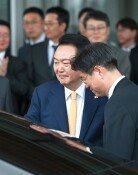Compromise and Trust at G-20 Summit
Compromise and Trust at G-20 Summit
Posted November. 11, 2010 10:56,
The Group of 20 summit in Seoul is expected to see smooth progress except for pending issues such as the dispute over foreign exchange rates. The agreement on a global financial safety net and development were almost reached at the meetings of G-20 vice finance ministers and the Sherpa that continued through Wednesday. Work is also underway on the wording of the main summits declaration.
On the most contentious issue of foreign exchange rates, G-20 leaders concurred to flesh out the agreement reached last month at the G-20 finance ministers meeting in Gyeongju, North Gyeongsang Province. Leading exporting countries such as China and Germany, however, strongly oppose setting a guideline on current account imbalances. If trade surpluses are restricted to under 4 percent of GDP, these countries must significantly cut exports. In addition, China, Germany and Brazil criticize the U.S. plan to inject 600 billion U.S. dollars into the U.S. economy to weaken the greenback. If the currency dispute is not resolved at the Seoul summit, protectionist barriers will spring up around the world and throw the global economic recovery off course. German Chancellor Angela Merkel also warned of protectionism by calling it the biggest risk.
Considering the atmosphere of the G-20 vice finance ministers meeting, chances are high that an early warning system against excessive trade imbalances will be adopted as proposed by the U.S. and that the leaders will agree to set a guideline on this before the G-20 summit in Paris next year. The currency dispute should be resolved through compromise and negotiations.
G-20 leaders must also identify roles that each country and group must play in tackling global imbalances. Experts in each country say the U.S. should strive to increase exports and China to boost domestic consumption to resolve the trade imbalances. Trust and concession are necessary for the G-20 to establish a new economic order after the global economic crisis. As the leader of the summit`s chair country, President Lee Myung-bak needs to exercise his leadership to elicit concessions at bilateral summits with world leaders.
The G-20 has a host of tasks such as setting up a global financial safety net, reforming the International Monetary Fund, promoting development, and drawing up and supervising implementation of action plans for sustainable and balanced global growth. To effectively perform these tasks, the premier forum for global economic cooperation should be made a permanent organization with a secretariat.







